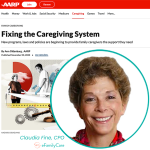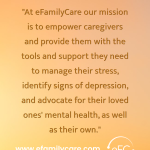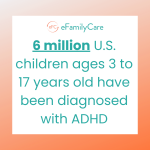Tips For Caring For Your Family Member With a Mental Illness or Dementia
Mood disorders such as depression and anxiety are common in the elderly. They are often related to the losses associated with aging such as loss of a spouse, loss of physical wellness or even retirement. Mood disorders may also be secondary to a medical illness or medication side effects. Psychiatric problems such as paranoia and other the psychotic symptoms can also occur, especially when an individual suffers cognitive losses due to Alzheimer’s, stroke, Parkinson Disease and other neurological illnesses.
Being responsible for an Aging Loved One with mental illness or cognitive impairment (dementia) can complicate the caregiving considerably and be highly stressful for the Family Caregiver. Even individuals with mild symptoms may be resistant to care recommendations. Those with more severe mental illness may need extensive oversight because of their impaired judgement and unpredictable behaviors.
The following tips can help to empower you to meet the challenges of caring for an Aging Loved One with mental illness or dementia.
Seek Support
Don’t take on the responsibility for an Aging Loved One with a mental illness or dementia alone. Find or build a support team that can help you along the way. Make a list of family members, friends, neighbors, etc. who you can count on to help you out.
Connect with others who are going through similar caregiving challenges. Locate support groups for people who are also caring for individuals with mental illness and other conditions with mood, behavioral or cognitive problems. Being able to relate to one another and share experiences can be extremely beneficial. Support
groups offer a safe place to vent feelings outside the family and help with reducing the sense of isolation and helplessness which are all to common when caring for a mentally ill or cognitively impaired Aging Loved One.
Create A Consistent Routine For You And Your Aging Loved One
Individuals with mental illness or cognitive impairment often lack the ability to control their emotions, organize their thoughts or manage their environment. Creating structure and predictable routines for these individuals is an important aspect of their care. Identify daily tasks and activities and create a consistent routine for your Aging Loved One. This will minimize episodes of anxiety and agitation experienced as a result of change and uncertainty. Establishing such a routine will help make your life feel less chaotic as well. Routines for your Aging Loved One might include, consistent times and methods of grooming and bathing, familiar foods, watching the same TV program or listening to the same music every day. Create a consistent caregiving routine for you as the Family Caregiver: establish a regular schedule for your visiting; build a limited repertoire of activities for you and your Aging Loved One and carve out regularly scheduled times off for yourself. This will not only promote predictability for your Aging Loved One, but also make your life less hectic.
Establish a Care Team
Build a professional care team. This may include health care providers, specialists, social workers, financial advisors, attorneys, and home care aids. Many Family Caregivers, however, find this challenging. There’s no shortage of providers but knowing how to vet and select the best professional can be overwhelming. This is why many caregivers choose to partner with a solution like eFamilyCare. Your professional care adviser, will provide you with criteria to make the best selection – not only considering professional reputation and standards of practice but also your Aging Loved One’s unique situation and your caregiving priorities. Your eFamilyCare Professional Care Adviser can also be a vital member of your care team. When caring for a mentally ill or cognitively impaired individual, pressing concerns and questions about how to handle a situation arise frequently. A quick message to your personal care adviser will result in a timely response as to how best to handle a given scenario.
Take Care Of Yourself, Too
As caregivers, it is very easy to lose oneself in the process of caring for someone else. While it may seem like you are being selfish when you address your own needs, if you are not taking care of yourself, it will ultimately be to the detriment of your Aging Loved One. Caregiver burnout is a real thing and can lead to you being unable to care for your Aging Loved One because you have neglected your own care.
Ensure you take time for yourself each week to decompress and be away from your Aging Loved One. Taking care of yourself is healthy and necessary for being a successful caregiver.
Support For Family Caregivers
Family members represent the greatest portion of caregivers in the United States. Most are not prepared to do this job, nor did they ask for this responsibility. The majority of Family Caregivers step up to the plate to fill a void in the health care system and to advocate for the health and safety of their Aging Loved Ones. Family Caregivers need and deserve support! This is why eFamilyCare is proud to offer family caregiver services to empower them to be successful and make their caregiving journey easier. Learn more today by contacting us to see if we can help you and your loved one.








